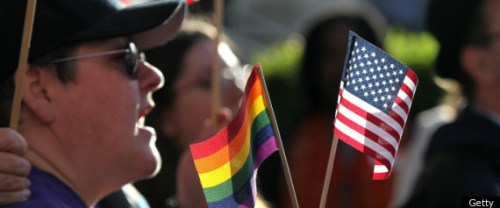North Carolina’s proposed ban on gay marriage has been causing a quiet stir for a few months now. Not because a state constitutional ban on same-sex marriage is really anything remarkable at this point — which is a sad story in and of itself — but because this is one of the first proposed bans that doesn’t seem like a foregone conclusion. But now, regardless of what we may have hoped and speculated, it’s come one step closer to reality: The North Carolina House has just voted to add a constitutional ban on same-sex marriage on the May primary ballot.

North Carolina has been the only southeastern state without a same-sex marriage ban; polling in the Elon area indicated that support for a ban was relatively low, and several faith-based organizations like the Universalist Unitarian Church opposed it. Some had hoped that putting the issue on a ballot while these numbers were still current might actually be a good thing, as it could mean the bill was less likely to pass. But based on the upcoming primary situation for North Carolina voters, things are looking less optimistic. From The Independent Weekly:
“…there will very likely be a hotly contested Republican primary for president next May in North Carolina, and a contested Republican primary for governor, and for lieutenant governor … and there will be no contested Democratic primaries at all. At least, no statewide Democratic primaries. In other words, a huge Republican turnout in assured in May, and a very light Democratic turnout is assured unless the pro-gay rights side can produce one.
This is fair? To pass a constitutional amendment when the electorate is skewed so badly in favor or one party and against the other?”
Reverend William Barber of the NAACP points out that placing the a controversial bill with strong support from social conservatives may actually be a ploy to draw out Republican voters in a Presidential election year. Rev. Barber issued an open letter Friday night asking North Carolina voters not to support the bill.
The bill was also passed to the ballot with no public hearing of the language involved, which wouldn’t really have changed the outcome, but would have made the bill feel slightly less like it was being intentionally and personally visited upon the queer community of North Carolina by the Republican majority. The decision passed with a 76-42 majority. Regardless of the message that may seem to send, however, the North Carolina legislature would like to remind you that this is ultimately about the rights of the voters and The People:
“My core belief has always been on the people’s right to vote on any issue,” said Clary, R-Cleveland. “A no vote on any of these issues from a legislator means you are stripping the people of the right to vote, whether you agree with the issue or not.”
As a refresher, North Carolina actually already has a state statute banning same-sex marriage; what’s actually being left up to the voters is essentially the option to block state judges from ever overturning that law. The bill is awaiting a decision in the Senate right now, where it is expected it will also attain the three-fifths majority needed to make it onto the May 2012 ballot. There’s no telling for sure how voters will respond at the polls in North Carolina, but it is for sure that this vote is joining an equally upsetting one in Minnesota, while at the same time the people of Maine try to be the first state to win marriage equality by a popular vote, and Prop 8 maybe meanders its way to the Supreme Court. It will be a big year, and probably a hard year. Our nation will probably look different in a lot of ways by the end of it. This is how that begins.







